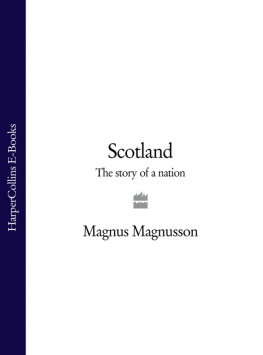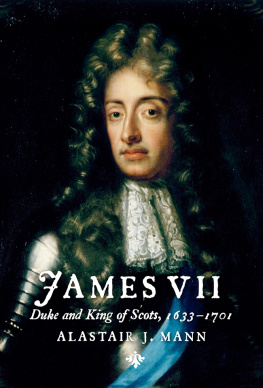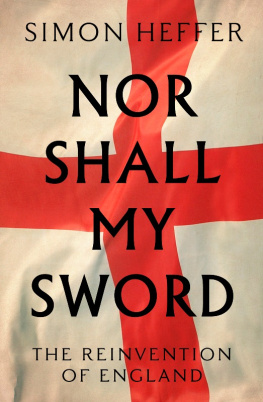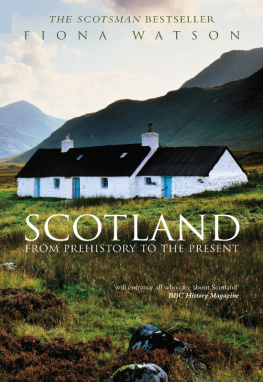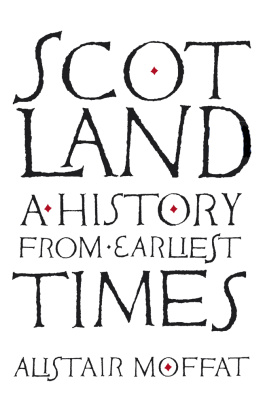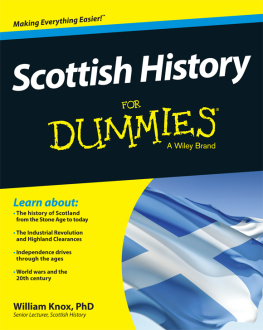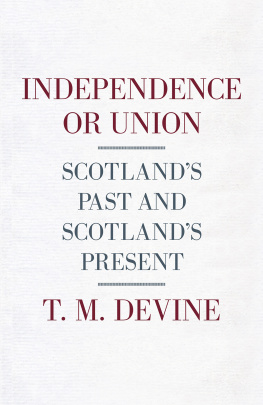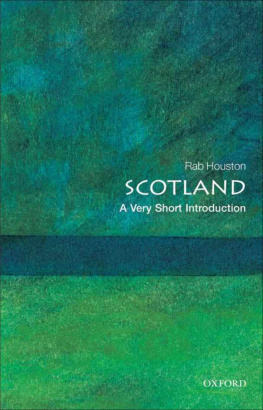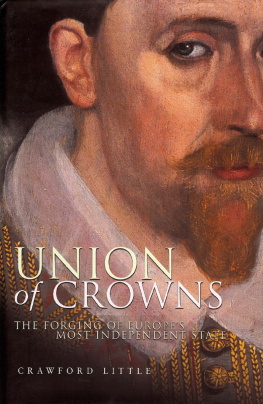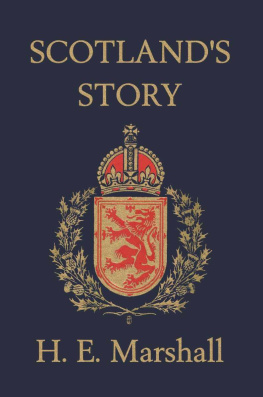PENGUIN BOOKS
A HISTORY OF SCOTLAND
Professor John Duncan Mackie OBE, Hon. LLD, was Professor of Scottish History and Literature at the University of Glasgow from 1930 until 1957. Besides holding office in many historical and antiquarian societies, and serving on a number of boards, he was appointed HM Historiographer in Scotland in 1958. Born in Edinburgh of Scottish parents, he was educated at Middlesbrough High School and received a First in History at Oxford, as well as the Lothian Essay Prize. He was appointed a lecturer at St Andrews at the age of twenty-two and during his occupancy of what Andrew Lang called the stool of Modern History he introduced the subject of Scottish History into the curriculum. He served with the Argyll and Sutherland Highlanders in the First World War, was twice wounded, and was awarded an MC. He returned to St Andrews and in 1926 became Professor of Modern History at the University of London (Bedford College). Among his many publications are Negotiations Between James VI and I and Ferdinand of Tuscany (1927), Cavalier and Puritan (1930), Andrew Lang and the House of Stuart (1935), The Earlier Tudors (1952) and A History of the Scottish Reformation (1960). Professor Mackie died in 1978.
Geoffrey Parker obtained his BA, MA and Ph.D. at Cambridge, before teaching at St Andrews University from 1972 to 1986. He is currently Distinguished Professor of History at the Ohio State University. His publications include The Dutch Revolt (Penguin, 1977), The Thirty Years War (1984), The Military Revolution (1988), The Spanish Armada (with Colin Martin; Penguin, 1988) and The Grand Strategy of Philip II (1998). Success is Never Final: Imperialism, War and Faith in Early Modern Europe is forthcoming in Penguin in 2002.
Bruce Lenman holds an MA degree from his native Aberdeen, and M.Litt. and Litt.D. degrees from Cambridge. He has taught in the universities of Victoria (British Colombia), Dundee and St Andrews, as well as being Harrison Professor in the College of William and Mary in Virginia, and Bird Professor in Emory University. His books include four on Jacobitism, a study of modern British politics, and two on colonial wars. He is currently working on the history of the British Empire before 1800 and is Professor of Modern History at the University of St Andrews, where Professor Mackie began his academic career.
J. D. MACKIE
A History of Scotland
SECOND EDITION
Revised and edited by
Bruce Lenman and Geoffrey Parker

PENGUIN BOOKS
PENGUIN BOOKS
Published by the Penguin Group
Penguin Books Ltd, 80 Strand, London WC2R 0RL, England
Penguin Putnam Inc., 375 Hudson Street, New York, New York 10014, USA
Penguin Books Australia Ltd, 250 Camberwell Road, Camberwell, Victoria 3124, Australia
Penguin Books Canada Ltd, 10 Alcorn Avenue, Toronto, Ontario, Canada M4V 3B2
Penguin Books India (P) Ltd, 11 Community Centre, Panchsheel Park, New Delhi 110 017, India
Penguin Books (NZ) Ltd, Cnr Rosedale and Airborne Roads, Albany, Auckland, New Zealand
Penguin Books (South Africa) (Pty) Ltd, 24 Sturdee Avenue, Rosebank 2196, South Africa
Penguin Books Ltd, Registered Offices: 80 Strand, London WC2R 0RL, England
www.penguin.com
First published in Pelican Books 1964
Reprinted with revisions 1969
Second edition 1978
Reprinted in Penguin Books 1991
Copyright J. D. Mackie, 1964
Copyright J. D. Mackie, Bruce Lenman
and Geoffrey Parker, 1978
All rights reserved
Except in the United States of America, this book is sold subject to the condition that it shall not, by way of trade or otherwise, be lent, re-sold, hired out, or otherwise circulated without the publisher's prior consent in any form of binding or cover other than that in which it is published and without a similar condition including this condition being imposed on the subsequent purchaser
ISBN: 978-0-14-192756-5
CONTENTS
LIST OF MAPS
INTRODUCTION TO THE
SECOND EDITION
I N revising a text as durable and as distinguished as this one, it has been our aim to introduce only those changes which were essential to keep the book up to date and serviceable. Although there has been a great deal of minor modification, the bulk of the text is still very much that of Professor Mackie, and his revisers have come to admire greatly the extraordinary concision of his style. Substantial changes were only essential at the end and the beginning of the book. At the beginning the decision has been taken to drop the archaeological section, while preserving the very useful topographical introduction. The case for excising the archaeological section rested mainly on the enormous development in archaeological research in Scotland in recent years. This had produced a mass of new evidence, and a host of new problems, on a scale which ensures that no summary of the state of the science can have a very long lifespan. Nor, indeed, can it at present hope to answer many major questions, for the overall effect of the past generation of research has been to throw up many more problems than solutions. At the other end of the text it was essential to expand Professor Mackie's account of modern Scotland, partly because recent developments have ensured that historians look back on Scotland's twentieth-century history with new perspectives, partly because it seemed essential to provide a narrative of events coming closer to the present day than the unrevised text. On the other hand, the point at which history blends with current affairs is a peculiarly difficult one for the historian, and our solution has been to carry a continuous narrative up to roughly 1970, and to mention some of the major factors affecting developments in Scotland in the 1970s. It is the hope of the revisers that they have combined piety with discrimination in a way which enhances the great merit of this well-known book.
BRUCE LENMAN
GEOFFREY PARKER
Department of Modern History,
University of St Andrews
ACKNOWLEDGEMENTS
T HE editors would like to thank Miss Lee M. Smith and Mrs Marjorie Nield for their invaluable assistance in preparing this book for publication.
A NOTE ON SCOTTISH CURRENCY
T HE silver penny introduced in Scotland in the reign of David I (112453) was on a par with the English penny, but thereafter devaluation of the Scottish currency against the English was steady until, in the reign of James VI, the relationship was stabilized, roughly in 1600, three years before James ascended the English throne. The relationship may be illustrated at various dates in terms of pennies.
1373 | 4d. | Scots | = | d. English |
1390 | 2d. | Scots | = | I d. English |
1451 | 2d. | Scots | = | I d. English |
1456 | 3d. | Scots | = | I d. English |
1467 | 3d. | Scots | = | I d. English |
1483 | 3d. | Scots | = | I d. English |
1560 | 5d. | Scots | = | I d. English |
1565 | 6d. | Scots | = | I d. English |
Next page

